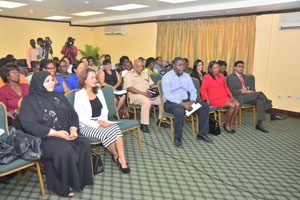THE Human Services and Social Security Ministry in another bid to “stamp out” the quiet tolerance of domestic violence yesterday launched the Domestic Violence Regulations, which address the deficiencies in the principal Act.Though the Domestic Violence Act of 1996 placed spotlight on the societal scourge, like any other, it was not a perfect legislation. The newly launched regulations seek to strengthen the Principal Act by addressing a number of shortcomings therein.

Education Minister, Priya Manickchand hailed the development as a step in the right direction, noting that the issue is a matter close to her.
She pointed out that domestic violence is caused primarily by gender inequality and where one partner uses physical force to control or dominate the other.
Speaking at the launch at Cara Lodge, Quamina Street, Georgetown, Manickchand who previously served as Human Services and Social Security Minister, said Guyana has come a long way since the passage of the Domestic Violence Act in addressing the scourge, as it is no longer viewed as an accepted norm as before.
But, she stressed that more still needs to be done in terms of getting everyone to understand and accept the seriousness of the problem.
Government on its part, apart from enacting the Domestic Violence Act of 1996, has also established the Men’s Affairs Bureau, the Women’s Affairs Bureau as well as implementing the Women of Worth (WoW) Project, just to name a few initiatives, to address domestic violence.
These came into operation following wide consultations with the people, as the Administration seeks to rid the society of this scourge, having recognised that it is not only harmful to victims, but also to the development of the country.
The fight against domestic violence, Manickchand also emphasised, will not be successful with the efforts of Government alone, but will require the effort of all stakeholders, more particularly the churches, masjids and temples.
Legal Affairs Minister and Attorney General, Anil Nandlall, though acknowledging that the regulations took some time to materialise, noted that it was born out of wide consultation with a variety of stakeholders.
He pointed out that the Principal Act will be amended as it omits a definition for domestic violence, but said the amendments will not affect the regulations and these also will be amended and expanded upon as deemed fit.
The definition for domestic violence will be a universal definition, more or less in keeping with the one embraced by the United Nations and various international treaties on the subject.
Domestic violence is not only a serious problem in Guyana, but a problem affecting countries the world over.
Women aged 15-44 are more at risk from rape and domestic violence than from cancer, car accidents, war, and malaria, according to World Bank data. Domestic violence is a pattern of abusive behaviour in any relationship used by one partner to gain or maintain power and control over his/her intimate partner.
It can be physical, sexual, emotional, economic, or psychological actions that influence their partners. This includes behaviour to intimidate, manipulate, humiliate, isolate, frighten, coerce, threaten, blame, injure or wound someone.

Domestic violence can occur regardless of race, age, sexual orientation, religion, or gender, socio-economic backgrounds and education levels. Acts of domestic violence can happen to intimate partners who are married, living together, or dating.
Up to 70 percent of women experience violence in their lifetimes. Children who grow up witnessing domestic violence, are among those seriously affected by this crime. Several global surveys suggest that half of all women who die from homicide are killed by their current or former husbands or partner.
Legislative reforms
Nandlall said apart from the Domestic Violence Act of 1996, other legislative reforms were made to address the problem, notably, amendments to the Prevision of Crimes Act of 2008, which makes it mandatory for those convicted of domestic violence to be supervised by the Police for three years after completion of their sentences; the Evidence Act of 2008, which protects witnesses including victim witnesses by allowing for the taking of oral evidence and making of submissions via visual links and the use of audio-visual link facility for conducting identification parades; and the Criminal Law (Procedures) Act of 2008, which allows Magistrates to exercise their discretion and admit into evidence a written statement in lieu of the actual presence of the witness (paper committal).
However, the minister noted that the challenge for the criminal justice system is finding an effective response to domestic violence. This continuous search for solutions and ways to combat domestic violence require constant revision of practices and policies.
As such, Nandlall said a review of the deficiencies of the Domestic Violence Act was conducted and Regulations have been created to remedy those deficiencies.
Under the Regulations, victims can enjoy access to the court without an Attorney or the filing of Affidavit Evidence as Oral Evidence is acceptable; persons who are not victims can make applications to the court; victims and abusers are separated during court matter to avoid aggravation of problem, but the alleged abuser is provided a reasonable timeframe to file his defence; serving of Court Order can be done by email; the police have a greater role in addressing domestic violence; and ambiguities in the principal Act have been clarified, among others.
The Legal Affairs Minister also stressed that legislation is not a panacea for domestic violence, but a mechanism to address the scourge, underscoring the need for all to play a role in ridding the scourge from society.
Human Services and Social Security Minister, Jennifer Webster said Domestic Violence does not only affect the victims, but society as a whole, contending that the Government remains committed in implementing international best policies to tackle the problem.
Source: https://guyanachronicle.com/2015/02/11/quiet-tolerance-of-domestic-violence-unacceptable-regulations-launched-to-tackle-scourge

